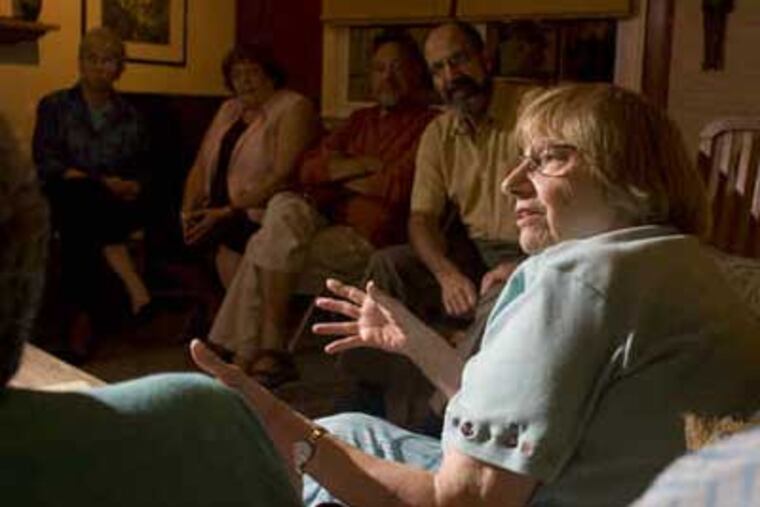
It would happen each fall around the Jewish new year. At the very time when renewal was in the autumn air, Arnold Barnett, an engineer from Moorestown, would go into a mild funk. His wife eventually figured it out: He was less than enamored with high holiday synagogue services.
"He simply wasn't engaged by what went on inside our Reform synagogue, or with the traditional approach to Judaism," said Ellen, 70. "I knew he was struggling. So sometimes, I would just go to services alone."
Then last year, the Barnetts saw a small notice in a local Jewish newspaper about a recently formed group in South Jersey. "We went to a meeting that was focused on Jewish history," Arnold, 71, recalls, "and that was something I could relate to. It was much more appealing."
And so the Barnetts will celebrate Rosh Hashanah, which begins Wednesday at sundown, by meeting Sunday with like-minded members of South Jersey Secular Jews - a group of people who may or may not believe in God, but do believe in caring about the world and one another, respecting and understanding Jewish history, and celebrating a culture that has meaning and emotional pull.
"The most important aspect of secularism is the survival and continuity of the Jewish people," said Paul Shane, a native New Yorker now living in Philadelphia and married to the daughter of Holocaust survivors.
Shane, 75, a member of the more established Philadelphia Secular Jewish Organization, believes humans are responsible for what happens on Earth. The here and now is central, and actions speak louder than words.
That philosophy resembles traditional Judaism. But secular Jews and traditional Jews part company when it comes to accepting religious dogma.
If you're secular, God is optional. (Traditional Judaism has "God at its heart. That's not an option," said Rabbi Ethan Franzel of Main Line Reform Temple Beth Elohim in Wynnewood.) Also, life-cycle events are handled individually - for instance, there are no set burial or wedding traditions in secular Judaism.
Of course secularism, in which one adheres to cultural norms rather than religious ones, is hardly new. During the Renaissance, from 1450 to 1600, and the Enlightenment in the 18th century, many Jews shed the God-oriented elements of their Jewishness, according to Shane, a professor of social policy at Rutgers University in Newark. That shedding also continued in the late 19th and early 20th centuries.
What's different today is that a growing number of secular Jews are finding one another, forming groups, and practicing the social responsibility Judaism requires - minus the synagogue.
Rifke Feinstein, executive director of the national Congress of Secular Jewish Organizations, says there are approximately 2,000 affiliated secular Jews in the United States. But because seculars typically are unaffiliated, and therefore uncounted, estimates for the entire American secular population range from 8,000 to 40,000.
In the Philadelphia area, there are six such organizations for secular Jews - including the five-year-old South Jersey Secular Jews - all under the local umbrella cooperative venture called Kehilla for Secular Jews.
For many people, discovering that such an organization exists has been a relief.
" 'I thought I was the only one!' is what people often express when they discover that they are not alone in their secular relationship to their Jewishness," said Larry Angert, 59, a member of 11-year-old Shir Shalom: A Havurah for Secular Jews. "The Jewish tent is big, and there's room for all of us in it."
Some local secular groups, like Philadelphia's Sholom Aleichem Club, which started in 1954, and Philadelphia Workmen's Circle, founded nationally in 1900 to aid Jewish immigrant workers and to promote Yiddish, have graying memberships. Bob Kleiner, 85, of Elkins Park, a retired sociology professor at Temple University, and his wife, Frances, a teacher of Yiddish, both long active in the secular movement, lament that younger people are not actively involved in these historic groups.
But the formation of new groups, such as South Jersey Secular Jews, is evidence the movement still has traction.
Credit Naomi Scher, 64, of Cherry Hill, whose children attended the Jewish Children's Folkshul, another Kehilla group, which is a parent-run cooperative held at Springside School in Philadelphia. About 100 children receive their Jewish education, not in a traditional Hebrew school but in classes that nourish social justice and individual responsibility. Bar and bat mitzvah aspirants undertake personally meaningful projects that they ultimately share with the entire Folkshul community.
Although Scher formed relationships with parents of her children's classmates, commuting to Philadelphia became burdensome once her children graduated, and in 2005, the retired social worker decided to start a secular group closer to home.
What began as a gathering of eight to 10 people now regularly attracts 30, meeting monthly with speakers who address social and political concerns, Scher said.
Deborah Chaiken, 74, of Palmyra is delighted to have a group close to home. "In the formal Jewish community, I felt that I didn't really have a voice. Here, I know that I do."
Dues are $25 a year, and participants are asked to bring food for potluck dinners. Meetings are held on the second Sunday of the month at Unitarian Universalist Church in Cherry Hill.
South Jersey Secular Jews members Cary and Bilha Hillebrand of Cherry Hill call the group a welcome addition to the local landscape. For Bilha, 54, the philosophy of the group is more in keeping with that of her native Israel, where the majority of the population leads a more secular lifestyle.
"We are not in any way antireligious," says Cary, 60. "We hold the belief that we are responsible for what happens to ourselves and to the world. And to us, that's the essence of what religion is, and should be."